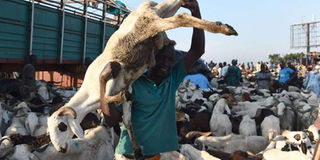Breaking News: Old Kijabe dam tragedy: Death toll rises to 40
Nigeria’s economic turmoil hit Idd fete ram sales hard

A vendor displays a ram for sale ahead of Eid-el-Kabir celebration at Kara Isheri market in Ogun State, southwest Nigeria, on September 7, 2016. The wealthy often buy several rams to distribute and the run-up to the festival is normally the busiest time of year for livestock traders. PHOTO | AFP
What you need to know:
- Livestock traders and buyers said the sale of rams for the annual festival of sacrifice had dropped sharply compared with last year.
KANO
With the naira in free fall and inflation soaring, few Nigerians can escape the country’s economic troubles — and that includes Muslims preparing for Idd al-Adha.
Livestock traders and buyers said the sale of rams for the annual festival of sacrifice had dropped sharply compared with last year, as Nigerians look to prioritise spending.
“Sales have stalled,” complained Ibrahim Shuaibu, a ram trader at the Hauren Shanu livestock market on the outskirts of Kano, the commercial hub and biggest city in Nigeria’s mainly Muslim north.
“By this time last year, I had sold more than 30 rams. I have so far sold not more than four this season,” he said, his face sweaty from the scorching sun as he waited for customers.
Animals are slaughtered during Idd to signify followers’ submission to Allah, with the meat shared among family, friends and the needy.
The wealthy often buy several rams to distribute and the run-up to the festival is normally the busiest time of year for livestock traders.
“One person would come and buy 50 rams at once to distribute as gifts,” said ram Abubakar Ibrahim, a vendor at Kano’s Hotoro market.
“But up till now, not a single person has bought five rams at a go from this market.”
Sabiu Ibrahim Hotoro, another trader, said buyers were coming in trickles.
Another, Mudassir Mustapha, predicted: “More than 35 per cent of people may not be able to offer a ram sacrifice this year.”
Nigeria officially plunged into recession in August after the second successive quarter of negative growth.
The fall in global oil prices has hit the crude oil-reliant economy hard for the last two years, squeezing government revenue, weakening the naira and forcing up inflation to more than 17 per cent.





